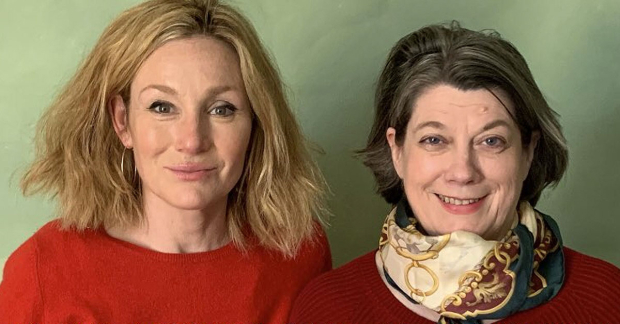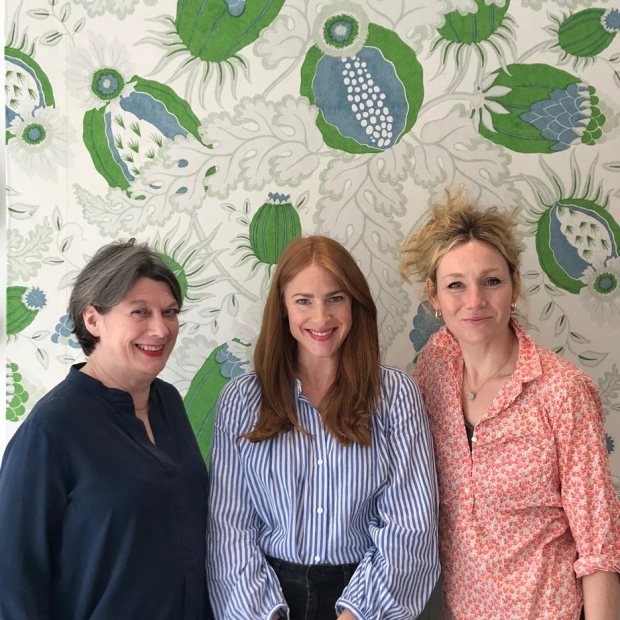Nancy Carroll and Sarah Crompton discuss their new podcast – ”As The Actress Said To the Critic”

As they release their latest episode, featuring an interview with esteemed playwright David Hare, we find out more about the podcast.
Can you describe how you and Nancy first met?
Nancy: Sarah and I lived around the corner from one another for 13 years without knowing it! We finally met at Hampstead Theatre, through a mutual friend, about four years ago. We’ve been friends ever since.
Sarah: I remember coming home from Hampstead on the bus, with Nancy hauling an Iceland carrier bag full of food, talking 19 to the dozen. We’ve not stopped talking from that day to this.
Where did the idea for the podcast start?
Nancy: We’ve always had very in depth talks about life and theatre. Then on Boxing Day last year, we found ourselves talking at the end of a family meal and we began to think about a more public discussion, from two sides of the fence. It was just after I’d experienced extremely divided reactions to Manor, a play I was in, and so the nature of criticism, during a post-covid recovery period, felt like an important and complex conversation to start having. Podcasts seem to have a place in these new conversations and the search for which direction we need to be taking.
Sarah: I was listening to a lot of podcasts and felt they were a form that encouraged relaxed conversation about major issues. I like shows like Red Scare where two friends sit down to discuss things they are interested in. We’re both quite straight-forward and both passionate about theatre so that felt as if it would work. I care about criticism and believe that it is an important element in understanding theatre; I grew up reading about plays as much as seeing them and I have always valued good writing about theatre. I wanted to discuss that in a new way.

© Sarah Crompton
Which topics have seen the most fruitful discussion between you?
Nancy: I’ve honestly loved every discussion we’ve had. Our chats take really fun and surprising journeys. Discussing criticism is very interesting and deeply nuanced. Particularly around changing language and taste. Hearing Sarah’s stories and opinions is so just awesome really.
Sarah: I feel exactly the same about the insights that Nancy brings to our conversations; her stories are so illuminating. They’re also often very funny; I was particularly fond of one she told about having to re-lay a carpet before she could actually get on stage. What I like about the podcast is that you never quite know where you will end up. We discuss our themes in advance, and research the subjects, but then the conversation shoots off all over the place. That feels fresh, and interesting to me. I hope it does to our listeners.
Do you think the so-called divide between artist and critic can be thoroughly dismantled?
Nancy: I think it should be dismantled and we should be accountable for our words, particularly when they are in print and when they determine, in part, the fate of any artistic endeavour. Actors and critics are historically intertwined. Many of the great critics shaped and recorded moments in theatrical history with passion and poetry, encyclopaedic knowledge and articulate observation. Journalists do have a duty of care to the reader as well. Actors, writers and directors are used to judgment, it goes with the territory. We pick ourselves up, bearing each unforgettable comment like war paint into the next battle.
However, the arts survive against the odds. We are enabled by good will, determination and philanthropy. Without audience support our cogs quickly stop turning. The pandemic made that all too real a possibility. Our co-dependent worlds feed our precious hub of theatre making activity. Discussing our points of view, and gaining insight into each other’s worlds, is not only fascinating but I would also say, really essential.
Sarah: I think the pandemic showed that the majority of critics are on the side of theatre; they want it to thrive, they campaigned hard for it to be supported, they care. My view, which I try to show in my reviews for WhatsOnStage, is that you have to watch something with an open heart and an open mind, try to describe what you have seen and then make a judgement on whether you like it. I don’t see critics and actors being opposed to each other; though as David Hare gleefully points out in this week’s As the Actress Said to the Critic, critics are often wrong in the eyes of history. We’re just lobbing thoughts into the debate.
Who have some of your favourite guests been?
Nancy: Talking to artists, directors and writers is bliss. Total bliss. Having David Hare as a guest this week was really special. He is such a passionate and prolific playwright and screenwriter and recording the podcast in his study was a huge privilege. We also had the joy of visiting Patrick Marber in his office too. There’s something about those intimate spaces that feels special, knowing such fantastic plays have been written in those rooms. Our first guest was Rosalie Craig, and it was a timely conversation, talking about gender-reversal in well-known roles. Truthfully, I have loved every guest and I look forward to having more.
Sarah: Our aim as we progress is to have a guest every couple of weeks, to open up the conversation as much as we can and to as many views – both artists and journalists – as we can find. There are so many big subjects to discuss, though I do also like the episodes when Nancy and I ramble about plays we have seen and thoughts they have prompted. What I love most is the way that guests say such unexpected things: a podcast isn’t like a newspaper interview where you are working in a strict structure. I was fascinated to hear David Hare talk about actors and acting, and Patrick Marber describing how Closer was helped by critics, and Rosalie Craig’s memories of working with Sondheim, who had recently died. They are all such rich conversations.
As the Actress Said to the Critic is available on Spotify and Apple.












